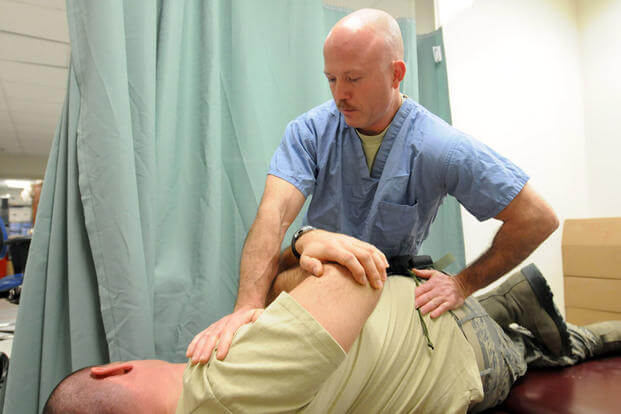Assessment of Chiropractic Treatment for Active Duty, U.S. Military Personnel With Low Back Pain: Study Protocol for a Randomized Controlled Trial
SOURCE: Trials. 2016 (Feb 9); 17: 70
Christine M. Goertz, Cynthia R. Long, Robert D. Vining, Katherine A. Pohlman, Bridget Kane, Lance Corber, Joan Walter and Ian Coulter
Palmer College of Chiropractic,
Palmer Center for Chiropractic Research,
741 Brady Street, Davenport, IA, 52803, USA.
christine.goertz@palmer.edu
BACKGROUND: Low back pain is highly prevalent and one of the most common causes of disability in U.S. armed forces personnel. Currently, no single therapeutic method has been established as a gold standard treatment for this increasingly prevalent condition. One commonly used treatment, which has demonstrated consistent positive outcomes in terms of pain and function within a civilian population is spinal manipulative therapy provided by doctors of chiropractic. Chiropractic care, delivered within a multidisciplinary framework in military healthcare settings, has the potential to help improve clinical outcomes for military personnel with low back pain. However, its effectiveness in a military setting has not been well established. The primary objective of this study is to evaluate changes in pain and disability in active duty service members with low back pain who are allocated to receive usual medical care plus chiropractic care versus treatment with usual medical care alone.
METHODS/DESIGN: This pragmatic comparative effectiveness trial will enroll 750 active duty service members with low back pain at three military treatment facilities within the United States (250 from each site) who will be allocated to receive usual medical care plus chiropractic care or usual medical care alone for 6 weeks. Primary outcomes will include the numerical rating scale for pain intensity and the Roland-Morris Disability Questionnaire at week 6. Patient reported outcomes of pain, disability, bothersomeness, and back pain function will be collected at 2, 4, 6, and 12 weeks from allocation.
DISCUSSION: Because low back pain is one of the leading causes of disability among U.S. military personnel, it is important to find pragmatic and conservative treatments that will treat low back pain and preserve low back function so that military readiness is maintained. Thus, it is important to evaluate the effects of the addition of chiropractic care to usual medical care on low back pain and disability.
There are more articles like this @ our:
TRIAL REGISTRATION: The trial discussed in this article was registered in ClinicalTrials.gov with the ID# NCT01692275
Date of registration: 6 September 2012.
Keywords Low back pain – Chiropractic – Comparative effectiveness – Military – Spinal manipulative therapy – Pragmatic clinical trial
From the FULL TEXT Article:
Background
Low back pain (LBP) is well recognized as a prevalent and burdensome health problem in both military and civilian populations. [1, 2] It is also one of the most common reasons why members of the U.S. armed forces seek medical care. [3, 4] LBP, common in both deployed and non-deployed military personnel [5], is also among the most likely conditions to interrupt combat duty. [2, 6] In army personnel, LBP represents the highest 5-year risk factor for permanent disability. [7]
Because of the combined costs associated with personal suffering, healthcare, and disability expenditures, and the resulting impaired capacity of personnel to conduct military operations, LBP has been characterized as “the silent military threat”. [8, 9] Development of a more effective, early treatment that prevents chronicity and reduces recurrence is likely to mitigate some of the deleterious effects of LBP on individuals and the military healthcare system.
In the United States, the chiropractic profession contains more than 70,000 actively licensed practitioners [10] who specialize in conservative treatment for musculoskeletal conditions with a special focus on spinal health. [11] At least 7.5 % of the U.S. population seeks chiropractic care each year, representing over 190 million patient visits annually. [12, 13] The care offered by doctors of chiropractic (DCs) is consistently rated highly by patients in studies assessing satisfaction. [14-17] Randomized controlled trials (RCTs) have demonstrated that chiropractic care and its signature treatment, spinal manipulation, is an effective conservative care option for patients with LBP. [18-21] Chiropractic care or spinal manipulation is also endorsed as an evidence-based, cost effective, conservative treatment option in the clinical practice guidelines for patients with acute, subacute, and chronic LBP. [22-24
Read the rest of this Full Text article now!






Leave A Comment